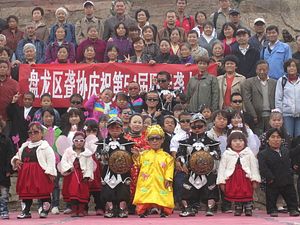There’s a theme park in Kunming called “Dwarf Kingdom,” where visitors can pay to gawk at performers with dwarfism. Chen Mingjing, who created the park in 2009 after seeing dwarf beggars at a railway station, once said, “I hope this ‘kingdom’ can help them live better lives.”
He’s therefore created an environment just for them (and, of course, the people who go there to be amused by them), saying there are only three prerequisites for employment: “No infectious diseases, no one older than 50, and no one taller than 4 feet 3.”
The grounds are replete with performance spaces and mushroom-shaped homes, because what other shape would you make a home if you knew people with dwarfism were going to live there? A hobbit-hole, maybe?
Incredibly, not everyone is pleased with the idea. In an episode of “An Idiot Abroad,” comedian Karl Pilkington visits Dwarf Kingdom and then phones actor Warwick Davis, who starred in the film Willow and played Professor Filius Flitwick in the Harry Potter series (Davis is 3 feet 6 inches tall).
“It’s like going back to the days of the freak show again, isn’t it really?” remarks Davis. “I mean, they’re all in there together and you’re going in there to gawp at them basically.”
“Well yeah, I did,” Karl admits, “and there is, like, little blokes in little funny outfits and all that, and you do sort of smile, but they’re smiling. It’s all right, isn’t it?”
“It’s segregation,” says Davis. “It’s exploitation. Seriously.”
This exchange nicely captures the debate about whether Dwarf Kingdom represents the exploitation of labor or a bite of the cherry, but it’s not necessarily an either/or scenario. Dwarf Kingdom, also sometimes translated as Kingdom of the Little People, offers a home and decent pay, but at a price.
“What is the difference between it and a zoo?” asks Gary Arnold, spokesperson for the Little People of America, in a 2010 article for The New York Times. The article goes on to mention Jean Van Wetter, Handicap International’s China director, who argues that while integration reduces prejudice, isolation only makes it worse. But, he says, almost with an audible sigh, “This is the kind of thing you see in China.”
There’s the rub, for Dwarf Kingdom is defensible precisely because life for people with dwarfism is so bad in China that lampooning their own medical condition is seen as a boon by comparison, never mind that it’s effectively a minstrel show. As a result, the employees seem happy with their lot. As one says, “I don’t care in the slightest if people come here to laugh at us. If they see how happy we are in spite of everything, maybe they will see how small their own problems are.”
Of course, the Western history of exploiting people with dwarfism goes as far back as one might care to look. At the end of the The Wasps, composed by Aristophanes in 422 BCE, the Greek Father of Comedy hurls a cheap provocation at the tragedian Carcinus and his sons, who were so short, he jokes, that they ought to be served as a meal. And Aristotle, in De Partibus Animalium, claims that people with dwarfism are less intelligent because — get this — the weight of their heads slows reasoning.
People with dwarfism remained a laughingstock for the next two millennia, whether as “court dwarfs” like Coppernin or performers such as General Mite. Many readers have likely seen the cringeworthy portrayal of Munchkins in 1939’s The Wizard of Oz, or the Oompa Loompas in 1971’s Willy Wonka and the Chocolate Factory.
The 1980s were better, with roles like Zelda Rubinstein’s wise psychic in Poltergeist or Warwick Davis as the titular hero in Willow. But it’s really in the post-2000 era that we’ve begun to see real progress for people with dwarfism in entertainment, for instance Michael J. Anderson as the carnival manager in the HBO series Carnivàle, Fa’afiaula Sagote’s starring in Samoa’s first feature film, The Orator, and Peter Dinklage of Games of Thrones fame, whose Tyrion Lannister is possibly my favorite character in any current series.
My point is that the world has only very lately reached maturity with regard to this issue, and it’s still very much a work in progress, plagued with all forms of human bêtise. The problem with Dwarf Kingdom isn’t so much that it exists, but that it’s the best thing going for such people in China. As Tom Shakespeare, a British sociologist with dwarfism, writes, “We just want to have the same range of career choices as everyone else, and to be accepted and respected as equal human beings.”

































